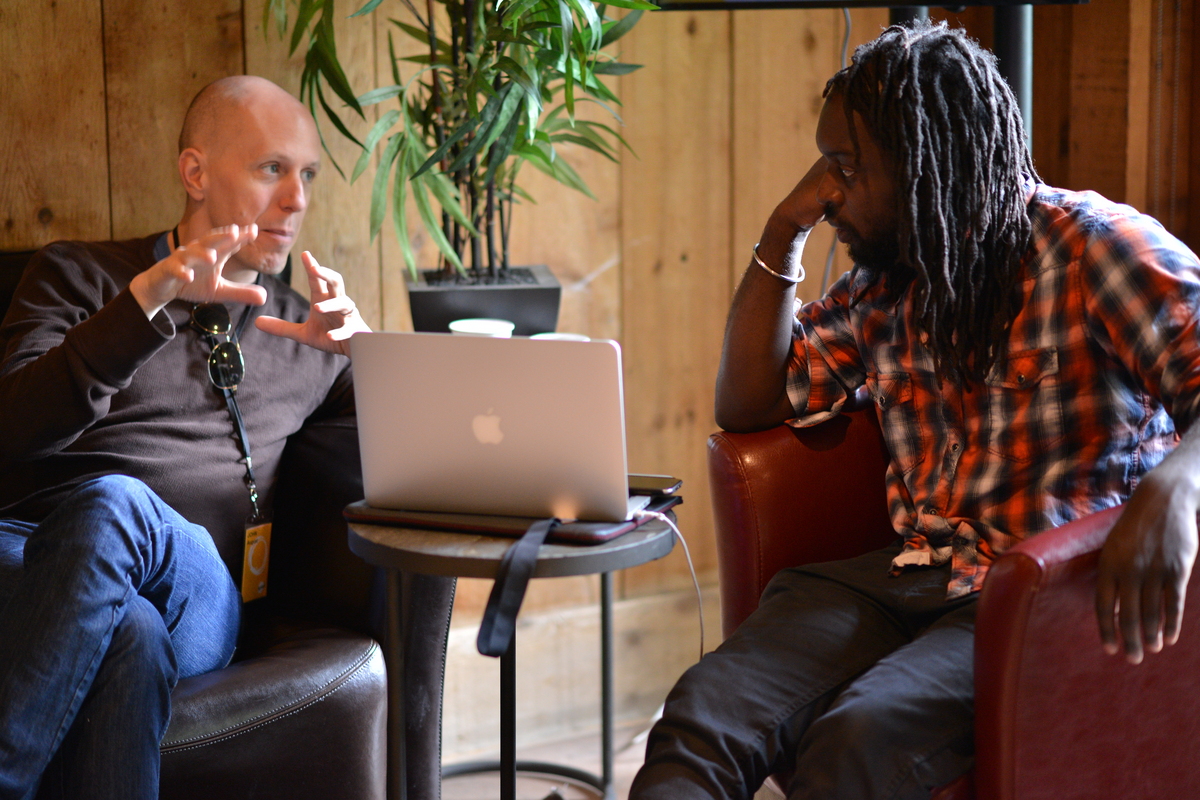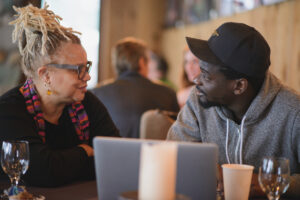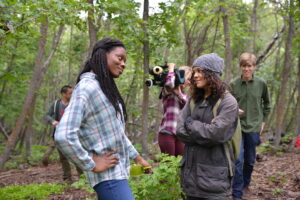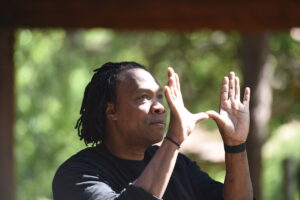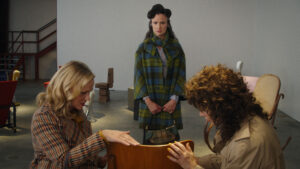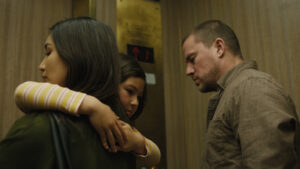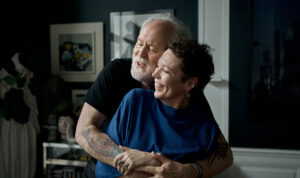John August with fellow Kibwe Tavares at Sundance Institute’s 2016 June Screenwriters Lab. Photo by Brandon Cruz for Sundance Institute
By Lucy Spicer
When screenwriter John August (Big Fish, Frankenweenie) first attended the Sundance Institute Screenwriters Lab as a creative advisor in 2000, he arrived with some level of impostor syndrome. He hadn’t been a fellow at the labs before, and he had only just premiered his first feature-length screenplay, Go, at the Sundance Film Festival a year earlier. “There was Scott Frank! And people who’d written all these iconic movies!” August remembers excitedly of his first encounter with fellow creative advisors at the lab. “And I’m like, ‘I’ve had one movie.’”
“I was just really flattered to be invited to sort of join the process,” continues August in a Zoom interview. “I’d always admired the Sundance labs. I’d applied for the labs with a project that didn’t get in for it, but what Michelle [Satter] described in terms of what the process was gonna be like sounded just like a dream, and I can really imagine from sort of both sides the ability to have smart people look at your work and give you guidance and, you know, feedback. But on the advisor side, it’s just a chance to see a bunch of projects at an early stage and just help them be the best versions they could be.”
August soon recognized that he had a valuable perspective as a young writer, as well as a creative instinct that would compel him to help guide early-career storytellers at the Directors and Screenwriters Labs for the next 25 years. August’s confidence in his own knowledge has grown during that time, but he also acknowledges that the labs themselves have stayed remarkably consistent. “One of the things that I think I admire most about the labs is sort of how little [they’ve] changed over the course of 25 years,” notes August. “The same intentionality is there from the first year I was there. We are looking for filmmakers who are telling new stories, who are telling, you know, movies we just haven’t seen anywhere else before.
“We’re looking for diverse voices, … but basically we’re looking for just really great, exciting filmmaking about areas of the world that we’re not seeing,” he continues. “And so there have been more international projects over the years, there have been queer filmmakers. We’ve seen different sorts of groups, but it’s most importantly the kinds of stories that we wish we could see on screen, and this is kind of where they began.”
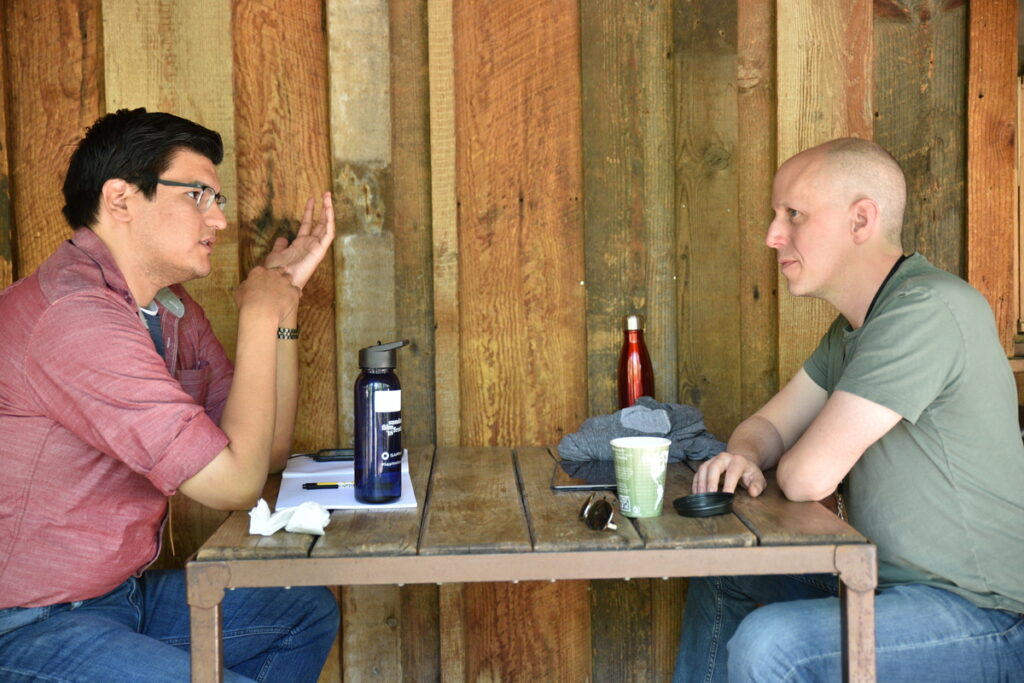
The fundamental ethos of the labs has worked in their favor — as well as that of the artists they serve. Since the labs’ inception over four decades ago, the filmmaking industry has changed rapidly, and access to both film-focused education and technology has expanded. But having a film school education or high-tech equipment neither increases nor decreases someone’s chances of becoming a fellow — they come to the labs to explore their own story and their artistry. It’s always been about process. “The point isn’t ‘polished;’ the point is to explore,” says August of the projects developed at the labs.
“You’re not trying to prove anything, you’re trying to explore something,” he continues. That exploratory nature helps to dispel any fears that fellows may harbor at the beginning of the labs. Just as August experienced impostor syndrome as a first-time creative advisor, many fellows inevitably come in nervous at the prospect of revealing personal projects to seasoned directors and writers. But August is quick to assuage any such worries. “It’s the safest place you can possibly enter into,” he says reassuringly. “You have a bunch of people who are there to help you out. It’s been fascinating working with some filmmakers who are coming from different domains, like, you know, painters and sculptors,” he continues.
Watching those artists thrive as they develop their own cinematic ideas is a thrilling and joyful experience shared by all advisors who volunteer their time to the labs year after year. “Obviously the fellows [have] gotten a lot of notes, they’ve got a lot of new things to think about, they’ve got new, exciting places to explore. But I think from the advisor’s point of view, if we’ve gotten to dip in and sort of creatively work on five different projects over the course of a few days, that’s really invigorating,” explains August. “It’s not taxing the way you think it would be. It’s actually really stimulating, and that’s been great.”
And that stimulation extends beyond the projects each advisor might be assigned to work with during the labs. “One of the great joys about being an advisor is that maybe you have four or five projects you’re meeting with the fellows on, but you’re in the advisors meeting and you’re hearing about all the other projects,” notes August. “You’re getting a sense of who the filmmakers are and what they’re trying to do.” When asked about a project he found particularly memorable in his 25 years of advising, August points to a title that he didn’t get to work on personally, but which stood out so clearly that its very presence at the labs left an indelible impression. That project was Swiss Army Man in 2014, written and directed by Daniel Kwan and Daniel Scheinert — otherwise known as The Daniels of Everything Everywhere All at Once fame. “It seemed just so absurd. It’s about a farting corpse!” recalls August with a smile. But as absurd as it was, the premise was something he’d never seen before. Swiss Army Man would go on to premiere at the 2016 Sundance Film Festival, where it won the Directing Award: U.S. Dramatic.
August is back as an advisor at the 2025 Screenwriters Lab, ready to inspire and be inspired once more. “I look at my role as an advisor to be kind of like your friend with a pickup truck,” he says. “And so I am there to help you move from where you were to where you want to be.” He’ll help the fellows carry their stories through a new door, he’ll offer suggestions about where to put their thematic furniture. “But it’s not my apartment,” he explains. “So I’m just there to help you, but I take no ownership over any of this stuff. If I can be a creative pickup truck, that’s a great function for me.”





